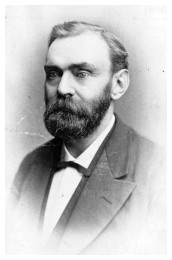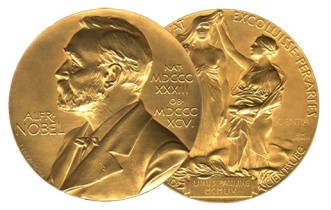The founder of the Nobel Prize was Alfred Nobel, a Swedish chemist and inventor. He invented the dynamite and the detonator. Through the use of dynamite in road and tunnel construction, he amassed a great fortune. In his will, he stipulated that a foundation should be created from this fortune to reward the greatest achievements in science. The Nobel Prize remains one of the most prestigious recognitions in science even today.
 Alfred Nobel was born on October 21, 1833, in Stockholm. His father was an architect and constructor, while his mother, Andriette Nobel (Ahsell), came from a wealthy family. In 1837 his father went bankrupt and fled to St. Petersburg to escape his creditors, leaving his family behind. For five years, the mother supported the children until the family was reunited in St. Petersburg. There, the father once again became successful and the family could live in prosperity. Alfred did not attend school but was educated at home by tutors and professors, who taught him mathematics and physics. By the age of 17, he spoke Swedish, Russian, English, German and French fluently. He was well-versed in philosophy, literature and the natural sciences, though his greatest passion was chemistry. His father sent him on study trips to London and the United States. Between 1850 and 1852, he worked in the Paris laboratory of the famous chemist T. J. Pelouze. There he encountered a newly synthesized, remarkable liquid - nitroglycerin, discovered in 1847 by Italian chemist Ascanio Sobrero.
Alfred Nobel was born on October 21, 1833, in Stockholm. His father was an architect and constructor, while his mother, Andriette Nobel (Ahsell), came from a wealthy family. In 1837 his father went bankrupt and fled to St. Petersburg to escape his creditors, leaving his family behind. For five years, the mother supported the children until the family was reunited in St. Petersburg. There, the father once again became successful and the family could live in prosperity. Alfred did not attend school but was educated at home by tutors and professors, who taught him mathematics and physics. By the age of 17, he spoke Swedish, Russian, English, German and French fluently. He was well-versed in philosophy, literature and the natural sciences, though his greatest passion was chemistry. His father sent him on study trips to London and the United States. Between 1850 and 1852, he worked in the Paris laboratory of the famous chemist T. J. Pelouze. There he encountered a newly synthesized, remarkable liquid - nitroglycerin, discovered in 1847 by Italian chemist Ascanio Sobrero.
Nobel observed the phenomenon that when nitroglycerin was accidentally spilled on diatomaceous earth, the resulting substance was much easier to handle, less sensitive to shock and thus safe to transport - yet still explosive when ignited with a detonator. This discovery led to the invention of dynamite which quickly spread and was widely used in industrial blasting. Nobel became wealthy, travelled extensively, but never married. He died of a stroke in San Remo on December 10, 1896. His estate was estimated at 9 million dollars.
The Nobel Foundation was established based on the will of Dr. Alfred Bernhard Nobel, dated November 27, 1895. The relevant sections of the will are as follows:
“The whole of my remaining realizable estate shall be dealt with in the following way: the capital, invested in safe securities by my executors, shall constitute a fund, the interest on which shall be annually distributed in the form of prizes to those who, during the preceding year, shall have conferred the greatest benefit to humankind. The said interest shall be divided into five equal parts, which shall be apportioned as follows: one part to the person who shall have made the most important discovery in the field of physics; one part to the person who shall have made the most important chemical discovery;one part to the person who shall have made the most important discovery in physiology or medicine; one part to the person who shall have produced the most outstanding work in an idealistic direction in the field of literature; and one part to the person who shall have worked most effectively for the promotion of fraternity between nations, the abolition or reduction of standing armies and the establishment and promotion of peace congresses.
The prizes for physics and chemistry shall be awarded by the Swedish Academy of Sciences; for physiology or medicine by the Karolinska Institute in Stockholm; for literature by the Stockholm Academy; and for peace by a committee of five persons elected by the Norwegian Parliament (Storting). It is my most important wish that - in awarding the prizes - no consideration shall be given to the nationality of the candidates, but that the most worthy shall receive the prize, whether they are Scandinavian or not.”
The Nobel Prizes are awarded by the Royal Swedish Academy of Sciences, with the sole exception of the Nobel Peace Prize. According to Nobel’s will, the Peace Prize is awarded by a committee of five members elected from the Norwegian Parliament (Storting).
The first Nobel Prizes were awarded in 1901. The first laureate of Hungarian origin was Philipp Lenard, who received the Nobel Prize in Physics in 1905 for his atomic model based on cathode ray investigations.

The Categories of the Nobel Prize
- Nobel Peace Prize
- Nobel Prize in Chemistry
- Nobel Prize in Literature
- Nobel Prize in Physics
- Nobel Prize in Physiology or Medicine
- The Sveriges Riksbank Prize in Economic Sciences in Memory of Alfred Nobel (since 1968)
Qualification requirements for Receiving a Nobel Prize
- The Swedish Nobel Committees reward specific achievements, not a lifetime work
- A prize may only be awarded to a person while they are alive
- The prizes in science and literature may be awarded only to individuals
- The Peace Prize, however, may also be awarded to organizations
Nomination
Candidates are nominated upon request by leaders of professional organizations, academicians and scientists. For the Nobel Prize in Literature, however, nominations may only be submitted by individuals, such as academicians, university professors and presidents of writers’ organizations. All nominators are bound by strict confidentiality.
The archives of documents relating to nominations and awards of Nobel Prizes are sealed and remain inaccessible to researchers for fifty years.